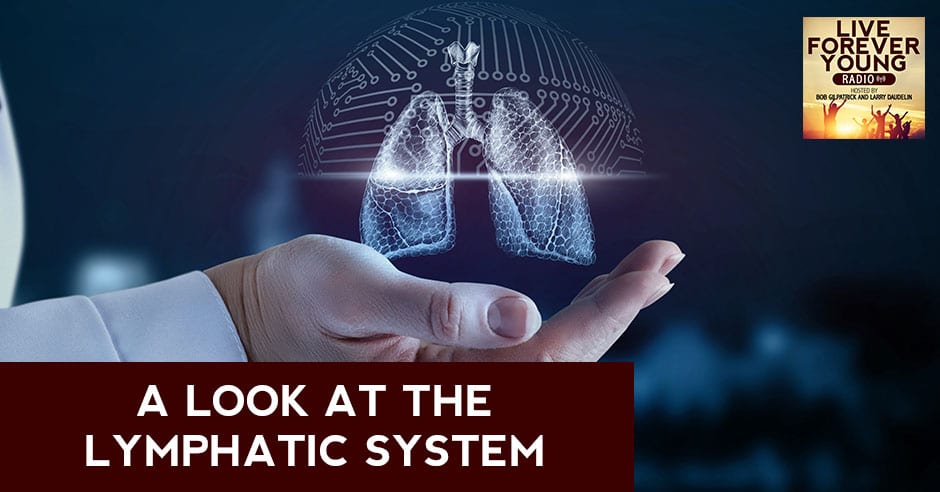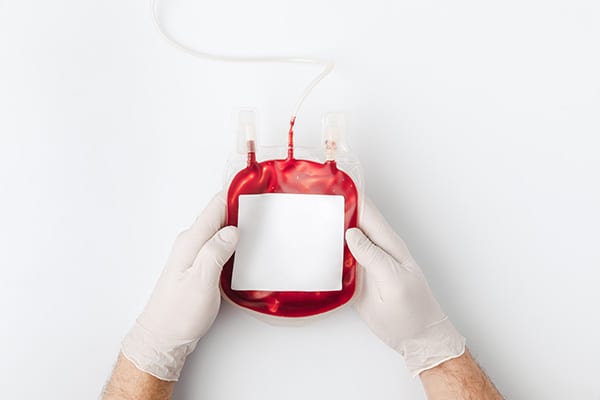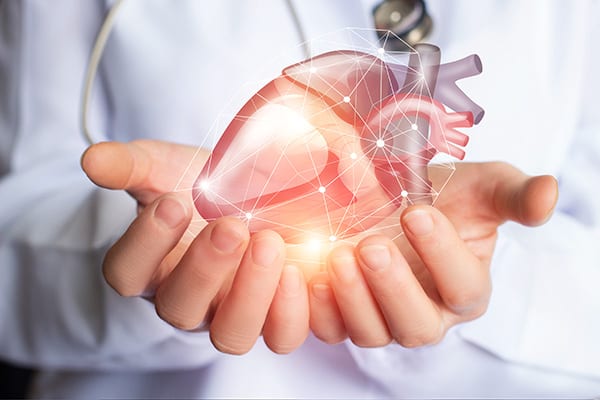A Look At The Lymphatic System

The lymphatic system is one of the body’s most important detoxification systems, yet not many people know about it, let alone care for it. Find out just how the lymphatic system works to cleanse and detoxify our bodies as Bob Gilpatrick and Rollie Culp break it down in today’s episode.
They share different ways you can keep your lymph system at peak performance and how you can optimize your health through manual lymph drainage. Don’t miss this episode as Bob and Rollie let you in on a new tool to keep your health at the optimal level.
---
Watch the podcast here:
Listen to the podcast here:
A Look At The Lymphatic System
The Importance Of Lymph Drainage
The lymphatic system is one of the body's most important detoxification systems and moves almost 17 liters of waste fluid every day. In this episode, Bob and Rollie take a closer look at the lymphatic system and how it works with your body's circulatory system to cleanse and detoxify. They discuss the importance of manual lymphatic drainage and how it is necessary to keep your body's circulatory system performing at its peak. Sit back, relax and get ready to live forever young.---
We are going to talk about the lymph system, its importance and what it does. The lymph system is a fluid system. It contains fluid in the vessels. The fluid moves through these vessels, similar to the way your blood moves. The difference is there is no pump for the lymph system, and there are also no red blood cells in your lymph system, which is why it is a clear color. The red blood cells are in your blood. They don't ever move into your lymph system. It runs parallel with the circulatory system of your blood, and it is part of your immune system.
Your body is constantly being exposed to bacteria. Most of it is in your interstitial fluid outside your blood and your lymph, where most bacteria tend to collect. That bacteria will make its way into your lymph system. Because the interstitial fluid is coming in through these little valves in the porous parts of the lymph fluid, the bacteria come with it. The part that your lymph system plays in your immune defenses primarily filters out those bacteria by having them neutralized when they get to these nodes.
In those nodes, the bacteria end up becoming a waste product. For something that doesn't have any blood in it, that is a lot. The lymph system is critical because it is constantly filtering these bacteria, but it is also collecting up fluid that is being dumped out of your blood. Your blood has plasma. It has got red blood cells and white blood cells, but the plasma is mostly water. Your blood is constantly dumping some of that water out. It is dumping out plasma. It is now in this neutral area where the fluid collects. If you didn't have the lymph system to pick it up, move it and eventually bring it back into the blood, then you would have all the swelling in your body, and your water would not be getting moved correctly.
It is moving a ton of fluid. I have seen something that says 17 liters. The volume of it is about the same amount as your blood, so there is a lot of lymph fluid. The lymph fluid is not moving as fast as the blood. The blood is quickly moving because there is a pump. Your heart is pushing it. The lymph system does not have a pump. It moves through a few different mechanisms. There are valves on the inside of the lymph vessel and open up to the outside of the lymph vessels to allow that fluid in. When the valve on the outside opens up, some fluid comes in, creates pressure and moves the fluid along.
Also, the valves on the inside are opening and closing about every seven seconds. In that opening and closing, the fluid comes through, closes, blocks it from going backward and keeps going forward as it pumps. Also, you have a smooth muscle that is attached to the outside of the lymph vessels. You also have skeletal muscle alongside your big muscles. When you move around and exercise, those muscles are moving, and they are helping to move the lymph also.

Lympathic System: The lymph system is very critical because it constantly filters bacteria, but also collects fluid that is dumped out of your blood.
The less you are moving around, the less the lymph will be assisted, especially considering that there is no main pump system like the circulatory system. You are relying on a lot of existing types of valve movement and pressure flow.
Once every seven seconds, the valves are opening. That is not a lot. The lymph is moving slowly, but that is okay because the vessels that it is moving in, which would be your veins or arteries, eventually come to a place where there is a node. A node is like a little ball and the lymph comes into the node. Inside that node is where the action happens, where the bacteria get neutralized.
That is the cleansing point. They have B cells and T cells inside the node, and they are doing the filtering. When it is ready, that fluid leaves the node and moves into the next vessel. Along the way, that vessel is picking up more fluid. It comes to another node for more detoxification.
Eventually, that lymph fluid makes its way back up to your heart, and the fluid gets dumped back into the blood. Not all of it. Some of it stays in the lymph and makes another turn, but most of it dumps back into the blood. This keeps the homeostasis of the right amount of water and nutrients in the blood and in the lymph, so you got this balance of the fluid. The balance of the fluid is in between that is in the interstitial fluid.
The lymph, blood and interstitial fluid are all interacting together to create this homeostasis, constant cleansing, immune system, killing off the bacteria and then getting it back into the blood, so there is enough water and lymph fluid that now becomes part of the blood system again before it also gets released back to the lymph. It is a symbiotic system.
It is like the old, "You can't have one without the other." It is a perfect marriage between the immune system, which helps cleanse and keep the circulatory system running.
Another thing the lymph system does is it participates as part of the digestive system. The reason is that when we consume fats, normally, nutrients get absorbed in your small intestine by these little hairs called villi. This is where the nutrients get absorbed, but fats are too big to be absorbed by the villi, so they get absorbed into the lymph, which is also in your small intestine.
We talked about the villi on a couple of different shows back when they get covered over in the plaque to perform. This is the same thing we are talking about here that we are on.
You also have blood vessels. Some nutrients get absorbed into the blood vessels, and some get absorbed directly into the lymph because the fat is too big. Eventually, it makes its way into your blood, but first, it has to go into your lymph. That is another thing. The components of your lymph system are your vessels and nodes. You also have other parts of it like your spleen and thymus that participate in the immune part of the lymph system as well.
Those are some organs associated with the lymph system. The issues that can happen and one of the reasons you want to pay attention to is if your lymph system becomes very sluggish, you are going to be inefficient in cleansing bacteria. When people go to the doctor, the doctor is feeling under their neck or behind their ears. They are trying to see if you have lymph vessels that are plugged up and enlarged because that gives them information about the functionality of your lymph system and maybe if you have an infection.
It is funny that you referenced when the doctors feel here, which is true. A lot of people think that is one of the only places where they have lymph nodes is up here because that is whenever the doctor said, "I am checking your glands." I have talked to a few people who don't realize how truly many lymph nodes there are throughout, like under the armpits, down in the inner thigh area and behind your knees. That is one of the things that I admitted. Growing up, you think, "Feel how your glands are." "I feel fine. Everything is good. It is right here." When you look at a schematic of the lymph system, it is like a roadmap, like the circulatory system. It is crazy to see them.
Another issue that can happen with lymph is if people have surgery. The most typical one is for women who have breast cancer surgery. Quite often, if people get cancer in their breast tissue, it will spread to the lymph nodes underneath their armpits.
The surgeon will remove those lymph nodes so that cancer doesn't continue to spread, but what happens then is the lymph that drains to those nodes from the person's arm because the lymph drains from your arm up to those nodes under your armpit, your arm can get very swollen with lymph. It is painful and it can be debilitating where you can't function anymore at what your job profession was. It is hard to make your way around the kitchen and the keyboard at the office.
Your arm is all swollen from the liquid. I was right. It is 17 liters that it pushes out. That is a lot of stuff. If you take out one of the main things that get it out of here, you are going to have a swollen arm. You are going to have pain and inflammation also.
In some women, both their arms get swollen if they have had double mastectomies and the vessels are taken from both. What people can do about that is good news because the lymph system has its genesis to it, as people have neurogenesis where we create new brain cells.

Lympathic System: The lymph goes back into your heart. You have to coax it to get to your heart and come down from your face.
We talked about that in one of our previous episodes. Your lymph system also has the capability to create new vessels that will move around spots. One of the things that a lymph drainage therapist can do with a person with the axillary nodes removed is they can move that limb with their hands and bring it up around their back.
There is a section called the back chain. You can train that lymph to train up. The axillary is better around to the back chain and then come back down into the thoracic duct before it dumps back into the blood. I had worked on people before that had that issue. Through patience, energy, focus and massage over time, 7, 8, 9, 10-hour long sessions that those vessels will form, the swelling will go away, and the person can go back to full functioning.
It is like rerouting the system because you don't have it. By coaxing it, the lymph system will begin to redirect it to a different spot. I don't know if most people realize this. A lot of times, when you rub your arms, it feels good to rub down because of your muscles, but when you are talking about the lymph because you are saying it goes to the heart, you were telling me, "You want to make sure you always rub up."
Even if you are working on your legs, you rub up towards your chest. Unless you are dealing with your neck and face, in which case it is going down. Remember, the lymph is going back into your heart. You have to coax it to get to your heart and come down from your face. What we have also seen sometimes before is different types of surgery. A C-section or someone getting a tummy tuck or liposuction can create a blockage. Some of the vessels can get cut during surgery and so you can get pooling of lymph.
Similar to the mastectomy, if you help with massage, it will reroute the lymph and you can return the person back to their normal structure and function. These are for people that go to become lymph drainage therapists. These are the types of things that they learn. There are other more serious issues regarding congenital lymph deformities that can occur before birth. They require a more intensive intervention from a surgeon and a medical doctor, who is skilled in different types of techniques that can mitigate these deformities.
If it was a congenital thing, that is not something you could reroute. What we want to do to maintain the health of our lymph system is, number one, make sure you stay hydrated because we are dealing with water here. The other is exercise. The more you exercise, the more those muscles alongside the lymph vessels will help with the movement of the lymph. The flow because there is no pump, so you got to move.
You also want to avoid toxins because your lymph is helping to move toxins out of your body. We have a whole separate episode on toxins and how to avoid toxins that you can find. You also want to avoid inflammation. You don't want generalized inflammation in your body because it is going to be damaging your whole body, including your lymph system. Your vessels and nodes don't like excess inflammation. They are already dealing with bacteria that create inflammation.
There is another episode on inflammation you can read that will help with that. Lastly, manual lymph drainage. Every person can learn to do lymph drainage for themselves, which is not drainage, but it is coaxing the lymph system along to move better and faster.
You told me that sometimes when the lymph, where the actual decontamination of the system is going down in the node, happens that can get overwhelmed, even in people who haven't had surgeries or issues with where it needs to be rerouted. A given node can get overwhelmed in a regular working system, so manual lymph drainage is a good way.
The node gets overwhelmed and plugged. Instead of moving the fluid along to the next node to do its job, it creates a blockage. A light, simple massage can help release that node so it will keep ongoing. We are going to have a video people can watch on manual lymphatic drainage that will show the sequence and the pressure that people can use. It is easy to learn but a highly effective technique.
Make sure you check it out on our YouTube channel because it is not something that we want you to watch, but it is something you can use. We talked about giving people tools to keep their health at the optimal level. This is another tool that you can use. Sometimes you don't realize that some of the things going on are because you are experiencing one of these blockages. I have talked to a lot of people before. A lot of people don't realize the extent of the system. Once they use this, it makes a difference.
That is about it for the overview of the lymph system.
Rollie, thanks for being here with us.
Thanks, everybody.
Important Links:
- YouTube - Boomers Forever Young






What can I take to open up my blood vessels especially my capillaries? Because I have acute subacute peripheral neuropathy. I want to make an order
Leave a comment